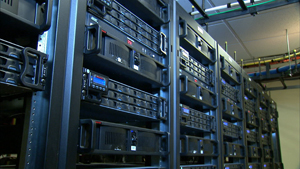
Honeywell Technology Powers Surveillance At New Las Vegas Mega Resort
- By Brent Dirks
- Apr 01, 2010
 While I’m officially back in the office digging out from a deluge of ISC West news and information, I wanted to share some of what I learned in a behind-the-scenes tour of some of the security technology at the new ARIA Resort and Casino in Las Vegas last week.
While I’m officially back in the office digging out from a deluge of ISC West news and information, I wanted to share some of what I learned in a behind-the-scenes tour of some of the security technology at the new ARIA Resort and Casino in Las Vegas last week.
Part of MGM MIRAGE’s new CityCenter complex that opened in late 2009, ARIA boasts 4,000 hotel rooms, 10 bars and lounges, 145 table games and 1,940 server-based slot machines.
Along with other members of the media, I took a tour of the surveillance area of the casino before ISC West started on Tuesday. The surveillance portion of the complex only covers the gaming areas. The security side, which we didn’t get to tour, covers the rest of CityCenter.
But the gaming portion of the complex is a massive 150,000 square-foot area with 1,600 cameras working in the area. There are more than 2,700 cameras total throughout CityCenter.
Leading the tour was Ted Whiting, ARIA’s director of surveillance. Jason Oakley, president of North American Video, the project’s integrator, and Honeywell’s Scott Harkins also attended the event.
Whiting said he chose Honeywell over six other competing companies.
“We chose Honeywell because they could integrate with whatever we had,” Whiting said. “We didn’t want to hear ‘no.’ We just wanted everything to integrate.”
Recording on 75 servers, the system is controlled by Honeywell’s MAXPRO VMS and based on a distributed architecture. Video is kept for a little longer than the Nevada Gaming Control Board’s required seven day requirement.
“Because of the distributed network architecture, it doesn’t matter when we can’t bring something up,” Whiting said. “Even if the clients fail, the record path is solid and it’s all being recorded at the head end.”
Despite hearing about the constant march to IP, Whiting said the majority of surveillance’s cameras were still analog with encoders. But there are some HD cameras at “chokepoints” in the complex and throughout the casino. With HD PTZ cameras installed at the craps pit, the camera resolution is good enough to read the numbers on the dice.
Even though you might think of advanced technology being placed throughout modern casinos, Whiting had a different take. For example, he said, facial recognition technology doesn’t work and that his personnel do a better job of identification.
“You’d be amazed at how many casinos in this town are still running VCRs,” he said.
 But ARIA is ready to go all IP when the time comes with all cabling less than 300 feet. Whiting also gave a nod to IP technology when he said that if the complex would have opened in 2011, it would have had all HD cameras.
But ARIA is ready to go all IP when the time comes with all cabling less than 300 feet. Whiting also gave a nod to IP technology when he said that if the complex would have opened in 2011, it would have had all HD cameras.
In the casino surveillance arena in general, Whiting said the he expects the next major move will be to all-IP based camera systems, then video analytics will begin to take shape in the industry.
With a great ISC West in the books, keep looking to Network-Centric Security for the latest news and information about all things IP-based security. We’ll see everyone in our home base of Dallas at ASIS in October.
About the Author
Brent Dirks is senior editor for Security Today and Campus Security Today magazines.